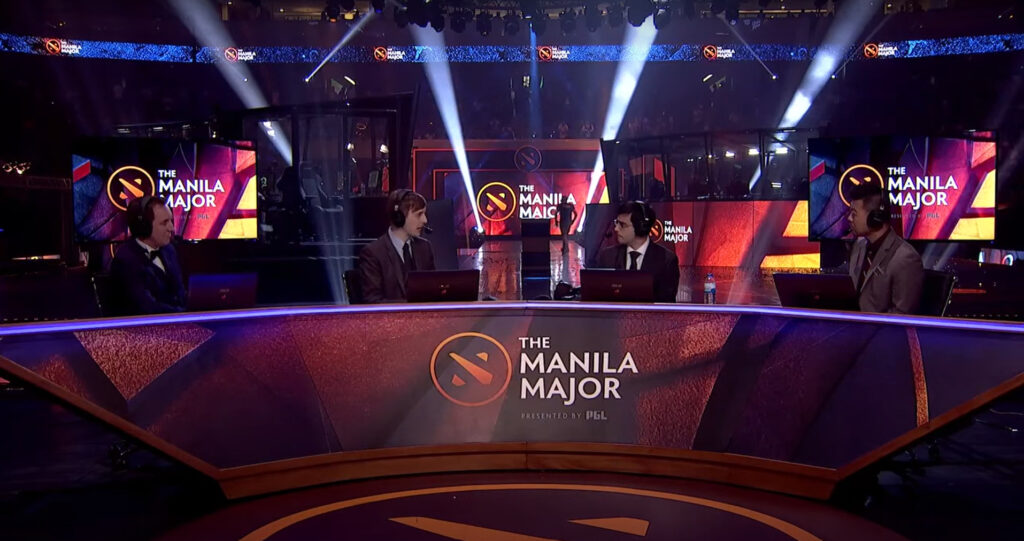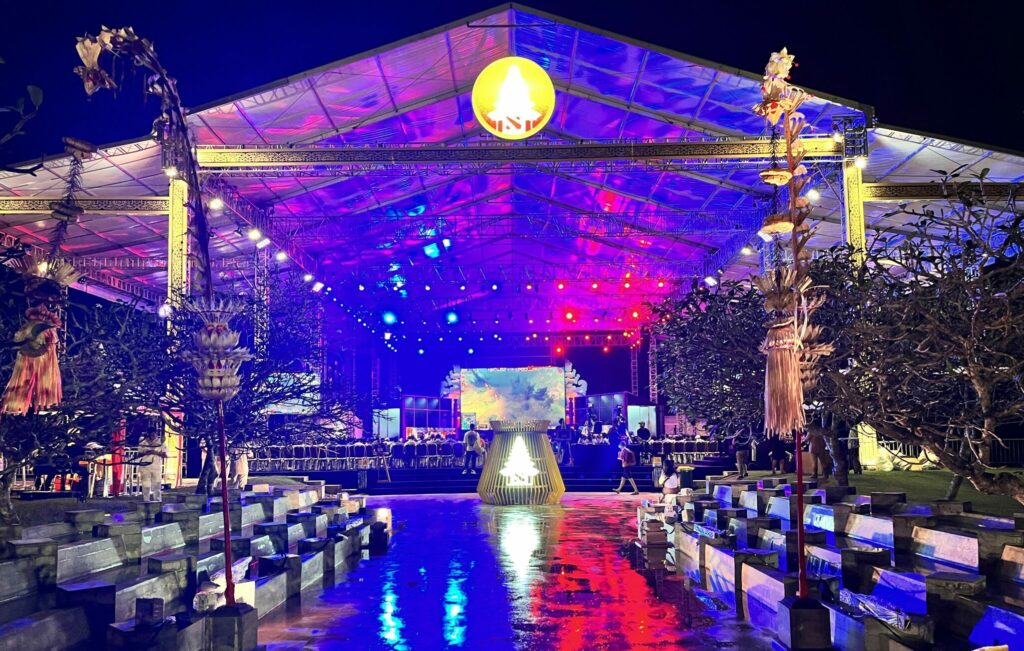In an interview at the Bali Major, Cap shares his thoughts on what the future of Dota as esports might look like.
Earlier this year, esports.gg spoke with Austin "Cap" Walsh at the Southeast Asian Dota Pro Circuit (SEA DPC) studio in Malaysia and talked about his journey as a talent. We were able to touch base with him once again at Bali Major for another interview to discuss the state of Dota as esports and follow-up on what has changed with him since then. This interview covered:
- Thoughts on Bali Major
- How Dota esports scene can improve
- If Valve should go back to funding Majors
- Cap's talent life and opinion on the industry
- His plans for the future
This interview took place on July 7, prior to the main stage of Bali Major.
Thoughts on the Bali Major experience
Hello Cap, thank you so much for doing this interview. How are you enjoying Bali Major so far?
Cap: "I’m enjoying it quite a bit. I know that there’s a lot of criticism for it. But there are very few events that take place in a really nice area like this, and this is obviously number one."
What were some of the criticisms you encounter regarding the Major?
Cap: "The Major obviously had its fair share of problems. Epulze being the partner for both for Lima and Bali Major opened itself up to a lot of criticisms. Most of them are valid but there are some that aren't. In general the community is pretty upset with the downtrend in event quality for Majors."
"Valve has been taking their hands more and more off of the pro scene, and I think that will continue. As sad as it is, games grow and die."
What Cap would do to improve the Dota esports scene
Planning the first Major shouldn't be less than a six-month window
What's your take on how Dota events should work?
Cap: "In general, what esports should be doing is focusing on quality through minimizing events. Having an audience in a stadium for only the three days or just the weekend makes the most amount of sense."
"But we can still make those days very quality and still run great, interesting and entertaining events for the thousands of people watching online. Just because we’re going through a downturn doesn’t mean we have to sacrifice quality of the event."
If there’s one thing you can do to improve the future of Dota as an esports, what would that be?
Cap: "Longer term planning is important. If Valve is going to be taking their hands more and more off of esports then I think it would be wise to plan the year ahead. Planning the first Major shouldn’t be less than a six-month window."
"These organizers, especially organizers who are new, are going to need that extra time. That would help the financial health of the scene. It helps with events being able to sell more and get better sponsors."
Should Valve bring back the good ol' days?

Should Valve go back to managing and funding their Majors fully?
Cap: "I mean it’s always kind of hard to tell what exactly Valve's motivations are. For example, there may be some part of Valve that is pushing to bring back the old Valve-funded Major. And then there’s a bunch of others who think that makes no sense financially. The consensus decision that we get versus what goes on inside Valve or Dota team could be very different. We don't really know."
"That being said, I do think it’s fairly obvious that Valve is giving away more of the esports scene and we just need to have a clear plan not just the year ahead but the next five years. That opens up the door for third party organizers in creating something to replace the DPC if Valve is going to entirely step out."
"Tournament organizers, players and teams all operate within the same ecosystem, so we should all be pulling towards the same direction. Everybody may have their own interest but we should have a good idea of what we want out of the Dota esports scene and push for it when those channels [with Valve] are open."
When Valve does let go of everything, do you think ESL will take the helm?
Cap: "I think it’s pretty clear that ESL DreamLeague has created something that rivals the DPC. But it’s always hard for third party organizers when you have a publisher involved. Valve can instantly shut down DreamLeague as soon as the publisher says so. I don’t think Valve will do that, but it is something that has happened in the past in other games."
"Riyadh [Riyadh Masters], in some ways, kind of looks like a TI product. There’s pros and cons in that. I work for ESL as a contractor but I’m not going to say it’s entirely a good thing that they do that."
Cap talks about his talent life
You mentioned SVG at our last interview. Since then, how has casting with him been?
Cap: "It’s great. I think one of the things I’ve noticed recently is that I have become a lot more comfortable with letting Avery take over with some of the action."
"The absolute best a casting duo could do is being able to interweave play-by-play and analysis from both sides. That is not easy to do, which is why the dichotomy of play-by-play and expert analyst is very traditional."
"One of the happiest things about our duos is that I’ve been able to comfortably let go sometimes in a middle of a fight and Avery will pick it up, which makes the listening experience a lot better. And yeah, Avery and I are really good friends, and I’m enjoying our working relationship. There’s a lot of things I think we see eye-to-eye on."
Would you consider him to be your best co-cast?
Cap: "I would say Avery and Blitz are like 1A and 1B. I think it would be easier to say after me and Avery have completed our run. Right now we’re in the middle of it and we’ll see. Maybe things stop working or maybe things just keep getting better and better."
"But I know a lot of people have a lot of fond memories of my duo with Blitz [William "Blitz" Lee] and so do I. He’s my best friend so it’s hard to replace that."
Is the Dota talent scene in good shape?
Has the new DPC format affect the talent scene positively or negatively?
Cap: "The format change from six weeks to three weeks has been mostly good because it opens up for third party organizers like ESL DreamLeague to come in. However, when they [DPC tournament organizers] do not do their stuff in a studio but remote instead is a huge negative. It means that there are a lot less money for talents working in studio versus remote."
Overall, would you say the talent industry is healthy?
Cap: "I think we have worked together a long time to create a healthy atmosphere. We’re all very cooperative. We share rates with each other. We try to push rates up. In that regard, we’ve created a strong foundation for the talent."
"We don’t undercut each other we’re very open with the rates we’re getting. Even if the Dota experience is at a downturn, I anticipate that the health of the talent scene is still going to be quite good."
Cap comments on the South American Dota English talent strike
Yet, there was that incident with the SA English talent. For that to happen, how can we say that the talent scene is healthy?
Cap: "So I bid to be the English coverage for SA DPC. And I’ll be honest, I didn’t get it but I wasn't sad because I don’t know how to monetize that. It is very difficult. I imagine it is a lot of hours but your viewership doesn’t get particularly high."
"It is incredibly difficult to monetize that so I do sympathize somewhat with the organizers for not being able to pay the talent. That being said, the rates there are abysmally low. We’ve seen a general trend of esports turning from traditional talent to streamers and I think there’s a world where the streaming world can help esports, so I don’t think we should shut that out entirely."
"However, you just hate to see talent having no jobs because organizers give the rights to some guy who may or may not treat the game or the region with the respect it deserves. There are harsh realities to face."
Cap's secret talent cabal
You can’t at least enlist and embolden your talent cabal to help? (Jokingly)
Cap: "Yeah I don’t know. I think Dota community has gotten like really paranoid lately. I thought about this, and I think the problem is that Dota’s gotten older and it has become less popular. And so the people who are left are a bunch of die hard fans. For majority reasons that is great. It just means you are pure Dota lovers and we can connect on that level.
"But that also means there is a significant minority that is growing who are obsessive about the ups and downs of the game. At the end of the day, Dota is an entertainment product. You probably shouldn’t be sending any death threats to anybody because they didn’t talk about your video game correctly."
"My favorite people to meet at LAN are the people who have moved on and have gone to different things outside of Dota but still love it enough to come back and watch some games. I think that’s really cool."
Looking toward the future
You came all the way from humble beginnings to being one of the top Dota casters out there. What's next for you?
Cap: "I’ve been asking that same question for probably like six seven or years since I left joinDOTA. Fortunately, I’m pretty motivated and hard working that I managed to stay near the top this entire time so I’m still getting work. But if that were to change, I would probably just throw myself into esports because I’m best positioned there."
"Ideally I would love to be a Dota commentator when I’m 55. But unrealistic to expect the game to keep going that long. I know what direction I’ll turn to when it happens, I just don’t know when it’s going to happen."
"Until then, I’ll keep going. I’ll be looking for other games to supplement my commentating if I find a game I’m in love with. But nothing ever hits like Dota."
Is there anything you’d like to say to your fans and the Dota community?
Cap: "To all my fans thank you for supporting me. This job is a dream and I always try to stay thankful that I’m still doing it. To the Dota community at large, thank you for supporting Dota. Even those guys who don’t like me, I still appreciate you because you put into Dota. You are a part of building up the game that I love and has created my career. So just very thankful for all that."
Thank you again for your time, Cap. We wish you the best in all of your future endeavors. Cap will next cast at Riyadh Masters 2023 starting July 19. Be sure to catch the games then!
You can access the full unabridged interview below:
Stay tuned to esports.gg for more Dota 2 news and updates.
